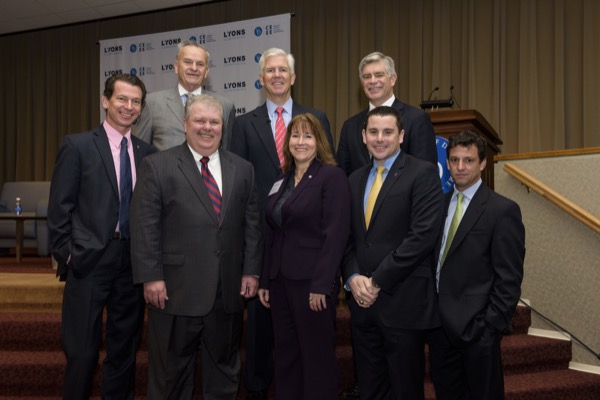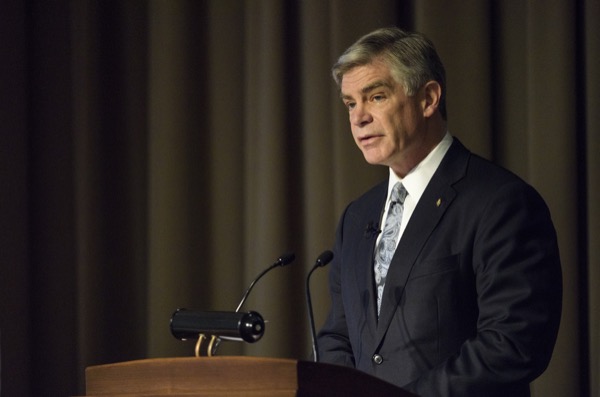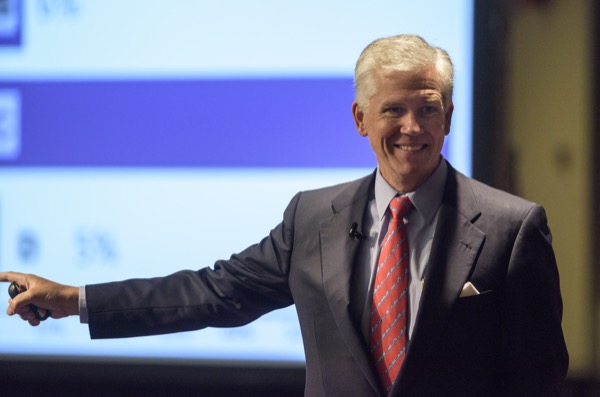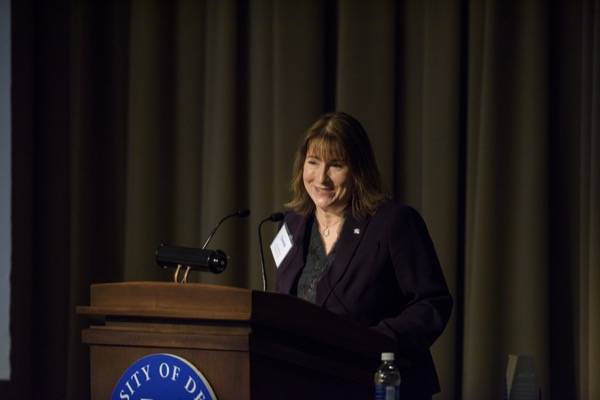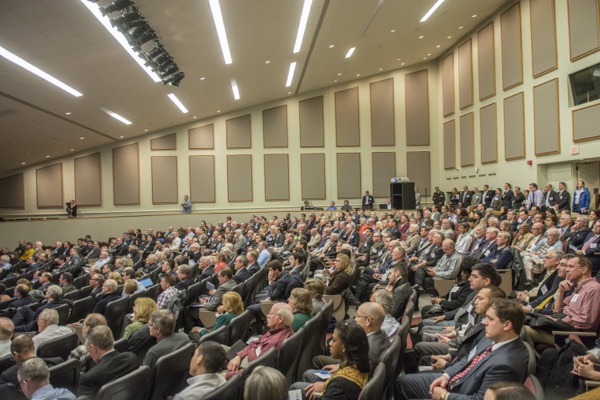

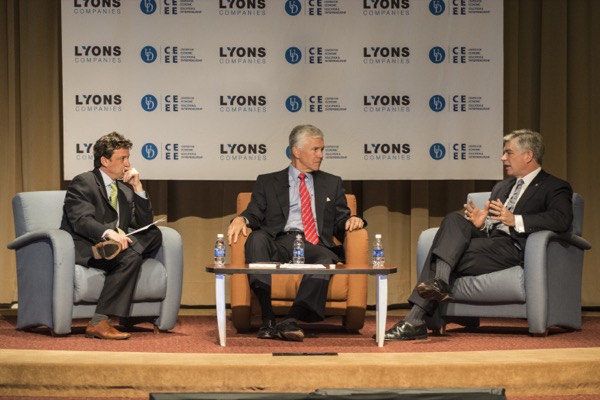
2016 Economic Forecast
Harker and Farr predict economic trends of the coming year at UD conference
4:05 p.m., Feb. 18, 2016--Patrick T. Harker, president and chief executive officer of the Federal Reserve Bank of Philadelphia and University of Delaware president emeritus, offered his perspective on the economy at a UD conference this week.
Harker provided an optimistic outlook on the coming year at the 2016 Economic Forecast, presented by UD’s Center for Economic Education and Entrepreneurship in partnership with Lyons Companies.
People Stories
'Resilience Engineering'
Reviresco June run
“Economic fundamentals are sound, and our financial system is in good shape,” said Harker during his address to an audience of almost 400, who attended despite icy conditions and a one-hour delay.
“Labor markets remain dynamic, income growth is solid, and consumer spending continues to increase at a solid pace,” Harker continued.
Harker, who also was quoted in a report in The New York Times, said that this economic growth will be supported by continued robust employment growth, with more than 2 million net new jobs created in the past three years. He also predicted stronger wage growth than the 2 percent achieved last year.
Harker also shared opinions on equity markets, real estate, inflation and monetary policy, as well as some Delaware-specific topics.
Despite recent events like DuPont’s steep job cuts, he said, “We have seen rapid growth in education and health services, and the state’s thought leaders have their sights focused on innovation.”
Harker pointed to UD’s Science, Technology and Advanced Research (STAR) Campus “as an example of how this region knows how to combine its strengths of the public and private sectors to grow and shape the economy of the 21st century.”
“My overall view of the economy remains upbeat,” Harker concluded. “We continue to face our challenges head on, and in doing so, we have made significant economic strides as a nation.”
After Harker’s address, Michael K. Farr, author, CNBC contributor and president of investment advisory firm Farr, Miller, and Washington, gave his take on the economy of 2016.
Farr said that despite his cautious, concerned projections at recent UD Economic Forecasts, he shares Harker’s optimism in many ways.
“I’m seeing things as half-full, and I don’t always,” said Farr, pointing to improvements in housing, the labor market, consumer debt, energy prices, the stock market and the banking system.
Farr also discussed increases in home ownership rates, home affordability and job openings as indicators of economic health. He said that this increase in job openings, coupled with lowered unemployment, will lead to rising wages.
This is a positive development, Farr said, as many of the economic gains of recent years are concentrated in higher-income groups.
“The middle class continues to get squeezed by stagnant incomes and rising costs,” he said. “We haven’t seen wage growth for the average American household. We’re back at about 1996 levels.”
“If the U.S. GDP (gross domestic product) is driven 70 percent by the consumer, what does the consumer have in his or her wallet to spend?” he continued, adding that consumption will grow when spending is broadened beyond the relatively wealthy.
“We’ve got to get more money into more hands,” he said, adding that many American households don’t feel safe to spend because they don’t have sufficient savings. “Economic inequality I think is going to be a long-term drag on economic growth.”
Farr stressed that this was not a political comment, but an economic one, adding that increased wages would help bring down the record high margins currently seen at S&P 500 companies.
Farr cited this year’s falling gas prices as a trend that helps get more money into the pockets of American households.
At his speech’s conclusion, Farr called for investment in infrastructure and education, corporate tax reform, promotion of immigration and reduction of trade barriers.
Despite the need for such changes, though, he predicted continued slow growth and low odds of a recession.
“This is still a great place to invest,” Farr said. “You cannot give up on the U.S.”
Panel discussion
Harker and Farr then participated in a panel discussion moderated by Jon Hilsenrath, chief economic correspondent for The Wall Street Journal. P.J. O’Rourke, political satirist and journalist, was not able to attend due to air travel delays.
Harker was cautious when responding to questions on raising interest rates, saying that watching the trends of the coming months will be important to the decision-making process.
“I don’t know exactly when it’s going to happen,” he said. “We really just need to follow the data.”
The panel further explored the issue of raising wages, which Harker said could have the positive impact of creating some inflationary pressure on the economy.
Also discussed were improvements within the banking system in recent years.
Farr cautioned not to underestimate how threatened the banking system was in 2008, saying, “That was a very dangerous time… We’re not there anymore.”
“I’d like to see the economy continue to strengthen as it has been, but also that’s starting to show up in inflation metrics,” Harker added. “We need to be careful in our policy path going forward, but I don’t see fundamental weakness in the U.S. economy at this point.”
Harker also agreed with Farr’s assertion that much of what influences the economy today comes from outside of the field of monetary policy.
“There are many other policies that have a profound impact on the health of the economy,” Harker said. “Those issues really matter.”
“As we move forward, monetary policy has to continue to play its role, but it’s only one player in building the economy that we all want.”
The panel then took questions from the audience, who also participated this year through a new smartphone-based polling system. Presenters polled audiences throughout the event about their opinions on the coming economic year.
Presentation of James B. O’Neill Award
Also presented at the conference was the James B. O’Neill Award for Excellence in Economic Education and Entrepreneurship. This year’s recipient was Connie Montaña, community relations manager for Bank of America.
CEEE Director Carlos Asarta said that Montaña’s leadership has been instrumental in providing personal finance education to first-year University students.
“Today, Connie and numerous other volunteers from Bank of America participate in our First Year Seminar by providing personal finance training to over 600 UD undergraduate students every year,” Asarta said.
“She has been a loyal friend, supporter and trusted adviser to the CEEE, ultimately helping us better prepare students for the financial opportunities and challenges that lie ahead,” he continued.
“I am truly honored, humbled and absolutely thrilled by this award,” said Montaña during her acceptance speech, adding that the award’s namesake “has galvanized, influenced and created a movement in financial and economic education.”
“Truly the center has been a great partner for Bank of America,” Montaña continued. “In partnership with them and many partners across the state and talented teachers, we’ve been able to effectively double the number of students in Delaware who are receiving financial education.”
She explained that thanks to programs co-sponsored by Bank of America and CEEE like the Personal Finance Challenge, students are now receiving financial education in 30 of 35 public high schools in Delaware.
But, Montaña added, there is still work to be done for the many students in Delaware and across the country who are lacking financial education. She and her team plan to continue this work.
“On behalf of my Bank of America teammates, and at Bank of America where our mission is to make financial lives better through the power of every connection, it is an honor to connect with you today and to accept this award.”
Article by Sunny Rosen
Photos by Kathy F. Atkinson and Doug Baker




